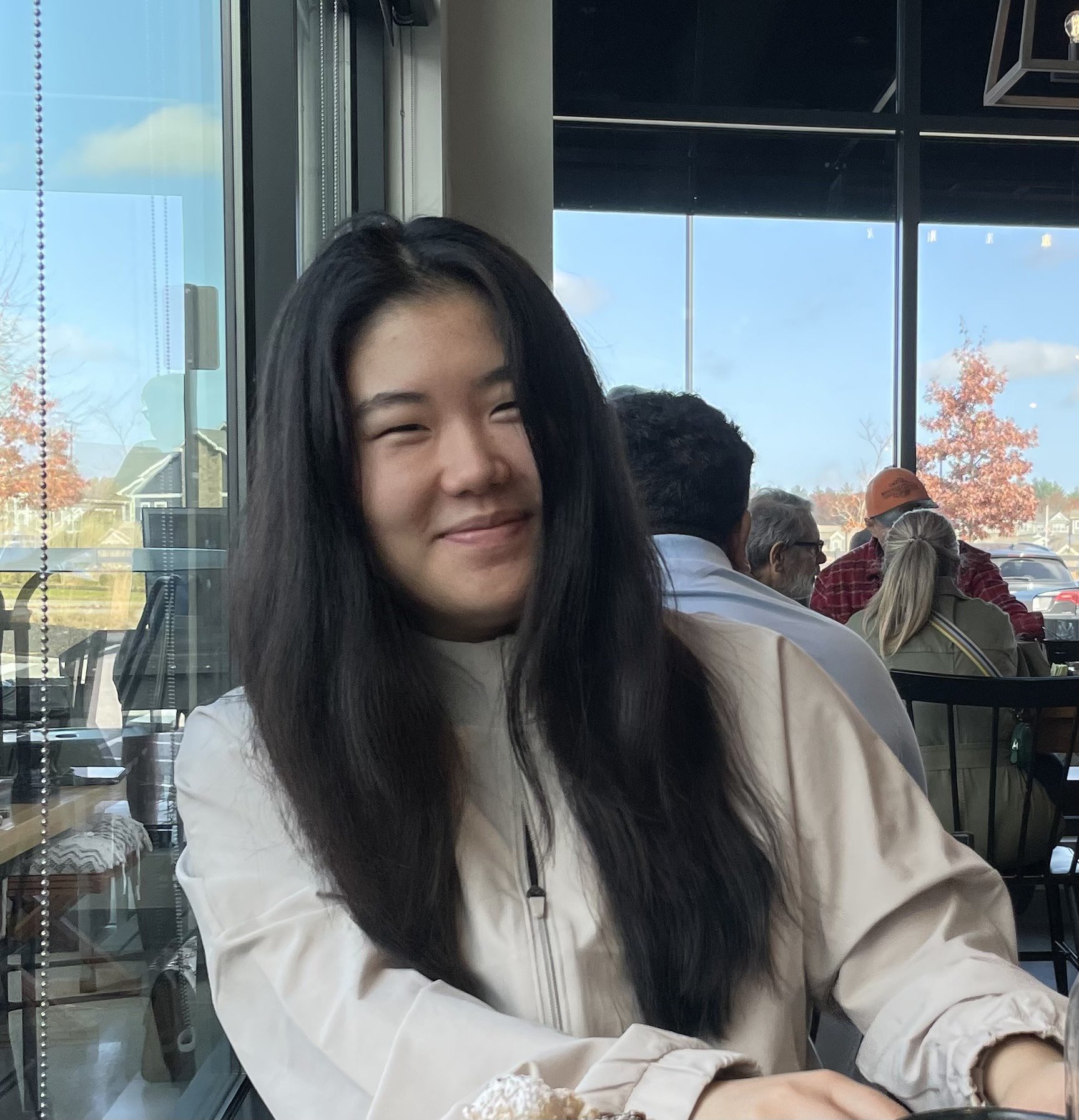TEAM LEADER
Grace Shin, Ph.D. Principal Investigator, Assistant Professor of Neurology
Grace is a new Assistant Professor recruited to the Ohio State University’s Department of Neurology in September 2023. She directs her team on the multimodal approach to comprehensively studying the underlying mechanisms of peripheral neuropathy, a painful sensory neuron disorder that can affect cancer patients after chemotherapy and immunotherapy. She is a member of the Comprehensive Cancer Center and also holds a courtesy appointment in the Department of Dermatology.
Grace received her first bachelor’s degree at Ewha Women’s University in Seoul, Korea, where she unexpectedly found her passion for research while studying engineering and business administration. To pursue her research endeavors, Grace moved to Australia and obtained her second bachelor’s degree in biomedical science at the University of Queensland. Following her graduation, she joined Dr. Brian Key’s laboratory to study axon guidance mechanisms for her honors and PhD (2006-2012). She studied an axon guidance molecule called RGMa, which turns out to be a multi-faceted gene involved in seemingly every step of brain development as well as after nerve injury via neurons and immune cells. It was during this time that she found her passion for translational research in neurological disorders. This time also guided her to start thinking about how multiple cell types work together to maintain the function of the nervous system in health and disease.
Since then, Grace’s research aims to apply what we learned from basic research for the effective treatment of pathological conditions. After a productive postdoc in Australia studying cellular mechanisms of synaptic connections in the developing brain, she was recruited as a senior postdoc in Dr. Wes Grueber’s lab at Columbia University in New York to develop and lead a project investigating the mechanisms of peripheral sensory neuropathy induced by chemotherapy called CIPN. As a part of the translational neuroscience research initiative at Columbia, Grace collaborated with scientists and physicians from multiple disciplines to build and utilize models to decipher the complex etiology of CIPN.
At OSU, Grace is a founding scientist for the CIPN clinic in Neurology, where she collaborates with clinicians and scientists to close the gap between basic science research and clinical practice. Her lab aims to understand the underlying mechanisms of painful sensory neuropathy caused by cancer treatment and their potential connections to painful skin disorders. She is passionate about mentoring the next generation of neuroscientists, biomedical scientists, and physician-scientists in and outside her laboratory.
Outside the lab, she spends her time in galleries, playing music, and learning about contemporary ceramics with her husband.
STAFF
Elliot Dion, BSc, MSc. Lab Manager, Research Associate
Beginning in October 2023, Elliot has been serving as both a research associate and lab manager for the Shin lab. His primary research goal is to further understand pathological changes in neuro-immune interactions related to chemotherapy-induced peripheral neuropathy (CIPN). As a pioneering member of the Shin lab, Elliot played an active role in the establishment of the lab and is now dedicating his time to mastering various in-vivo, in-vitro, and quantitative microscopy techniques. His research utilizes mouse models to explore alterations in the neuro-immune interactions and resulting pathological local and systemic changes underlying CIPN. To do this, he employs tools such as immunofluorescent-based volume imaging and proteomic assays in vivo following chemotherapy. Additionally, he combines mouse primary culture techniques to understand the cell-type-specific responses of neurons and immune cells to various chemotherapy agents.
While earning a Bachelor of Science in Psychology at Florida State University, Elliot developed a passion for studying the nervous system. To further his understanding of neuroscience, Elliot moved from Florida to Ohio and earned his Master’s in Applied Neuroscience at the Ohio State University under the guidance of Andrea Tedeschi (2021-2022). During his studies, Elliot characterized cell-specific migration patterns during wound healing response in the context of fibrotic scar formation after spinal cord injury in vitro. After earning his Master’s degree, Elliot continued in the Tedeschi lab for another year to hone a skillset in quantification, utilizing software such as Imaris and FIJI/ImageJ, to further explore pathological changes after spinal cord injury. As outside hobbies, he enjoys macro photography, reading fiction/fantasy novels, and playing with his cat, Sara(-tonin).
Publications:
Roy, D., Dion, E., Sepeda, J. A., Peng, J., Lingam, S. R., Townsend, K., Sas, A., Sun, W., & Tedeschi, A. (2024). α2δ1-mediated maladaptive sensory plasticity disrupts adipose tissue homeostasis following spinal cord injury. Cell Reports Medicine, 5(5). https://doi.org/10.1016/j.xcrm.2024.101525
Vidman, S., Dion, E., & Tedeschi, A. (2024). A Versatile Pipeline for High-fidelity Imaging and Analysis of Vascular Networks Across the Body. Bio-Protocol. DOI: 10.21769/BioProtoc.4938
Elizabeth Angel, BSc. Senior Research Technician
As a recent graduate with a Bachelor's degree in Biotechnology Engineering, I have participated in diverse research projects both domestically and internationally, driven by a profound curiosity for scientific discovery. My recent role as an international research exchange student at the University of Wolverhampton, UK, allowed me to refine my expertise in mammalian cell culture and molecular biology before joining the Shin lab.
Currently, I serve as a Senior Research Technician in the lab. Collaborating closely with Dr. Shin and other team members, I am responsible for various types of cell culture tasks, from routine maintenance to executing complex experiments. My main project investigates neuron-immune-skin interactions in peripheral neuropathy induced by cancer treatments. The goal of this research is to uncover how the innate immune system and skin cells influence neuronal health in the context of chemotherapy-induced peripheral neuropathy (CIPN). By elucidating these interactions, we aim to gain deeper insights into the mechanisms underlying CIPN, potentially paving the way for targeted therapeutic interventions.
Madison Smith, BSc. Senior Research Technician (Remote, Part-time, Columbia/Einstein)
Madison is a graduate of Columbia University where she completed her bachelor's in chemistry. She is currently enrolled in the Medical Scientist Training Program at Albert Einstein College of Medicine. Madison works on understanding neuron-immune interactions in an in-vivo Drosophila model of chemotherapy-induced peripheral neuropathy (CIPN). Immune cell dynamics in response to multiple chemotherapeutics are understood using genetic manipulations, microscopy, qPCR, FACS, and bulk RNA seq. These immune cell changes are correlated to neuronal degeneration phenotypes to better understand how different states of activation contribute to the pathogenesis of CIPN. This research can help to inform further translational studies in understanding and treating CIPN.
STUDENTS
Callie Barber, BA. Graduate Student, Biomedical Science Graduate Program.
callie.barber@osumc.edu
Originally from Brockway, a rural Pennsylvania town, I pursued my undergraduate studies at Washington and Jefferson College, majoring in Biochemistry with a minor in Spanish. Two summers of research at UPMC Children’s, focusing on pediatric glioblastoma, ignited my passion for scientific research. This led me to join the Biomedical Sciences Graduate Program (BSGP) at OSU. I joined Dr. Grace Shin’s lab for my dissertation thesis project in March of 2024 where our research focuses on understanding the peripheral mechanisms of pain. My current research centers on elucidating the role of MANF in neuron-immune interactions using the Drosophila model of CIPN. I also aim to establish a 2D/3D neuron-immune-skin environment using hIPSCs and develop a predictive model of CIPN via bioinformatic tools. I believe integrating these research efforts with clinical approaches could enhance the outcomes for patients with CIPN. Outside the lab, I enjoy running, cooking, playing soccer, and exploring breweries in Columbus with friends and family.
Katherine Cruze. Undergraduate Research Assistant.
I am a second-year student at The Ohio State University studying Neuroscience with a minor in Health and Society on the pre-med track. I am working with Drosophila models to study interactions between neurons and immune cells in chemotherapy-induced peripheral neuropathy, specifically focusing on signals derived from nociceptive neurons.
Surith Krishna. Undergraduate Research Assistant.
Surith Krishna is a third year undergraduate Honors Student and Health Sciences Scholar at The Ohio State University, pursuing a Bachelors of Science in Behavioral Neuroscience and a Bachelors of Music a vocal performance concentration. He is involved with investigating the toxic side effects of chemotherapy, particularly in the context of chemokine and cytokine-mediated neuron-immune interactions in CIPN. In addition to his work with the Drosophila model, he is also involved with human patient clinical trials, working with Dr. Shin and other collaborators to advance precision-based medical care for patients undergoing chemotherapy treatment.
Surith also serves as the co-president of Snehalaya, club dedicated to raising funds and awareness for HIV-positive women and children, victims of domestic violence, and individuals facing LGBTQ+ discrimination in India, as well as the secretary for OSU Global Medical Briagdes, where he will be embarking on a medical service trip to Belize in Dec. 2024. In his free time, he enjoys singing and going on long bike rides with his husky, Blue.
Vanessa Sims. Undergraduate Research Assistant.
I am a third-year student at The Ohio State University studying Molecular Genetics with a Spanish minor on the pre-optometry track. I am currently working to develop a novel in vivo model of chemotherapy-induced retinopathy in Drosophila. This will lead to further work looking into immune-mediated protective capacity in chemotherapy-induced retinal degeneration.
Benna Li. Undergraduate Research Assistant (Remote, NYU).
I am an undergraduate student at New York University's Gallatin School of Individualized Study studying Perception through neuroscience and philosophy. I worked on the Drosophila CIPN model and am working on neuron inactivation experiments along with developing a Drosophila CIPN cancer model.
Anna Scaria. Undergraduate Research Assistant.
I am a second-year undergraduate student at The Ohio State University, majoring in Nursing with minors in Spanish and Pharmaceutical Sciences. I currently work with mouse models to study neuro-immune interactions in the skin and dorsal root ganglion that influence chemotherapy-induced peripheral neuropathy. In my free time, I enjoy reading, crocheting, and hanging out with my family!
ALUMNI
Dominic Dodson. Former Undergraduate Research Assistant (Columbia).
I’m from Pittsburgh, PA, but currently live in New Jersey. I’m a 2023 graduate of Columbia University where I studied Psychology and Behavior. I’ve been working in the Grueber Lab with Dr. Grace Shin from November 2022 to May 2023, and have assisted in the behavioral experiments of her work.
To investigate the sensation of hypersensitivity in chemotherapy induced peripheral neuropathy (CIPN), we worked on developing a behavioral assay for Drosophila melanogaster larvae. This assay compared larvae with different treatments and assesses the nociceptive responses of each to acidic stimulation. Within this project I have been responsible for experimentally designing, operating, and statistically analyzing our data.
Jordan Turner. Intern (OSU). October-December, 2023
Jordan is a graduate of OSU, majoring in Entomology with former experience in social studies of cancer survivorship. He assisted with lab setup and Drosophila maintenance during his time in the Shin Lab.










